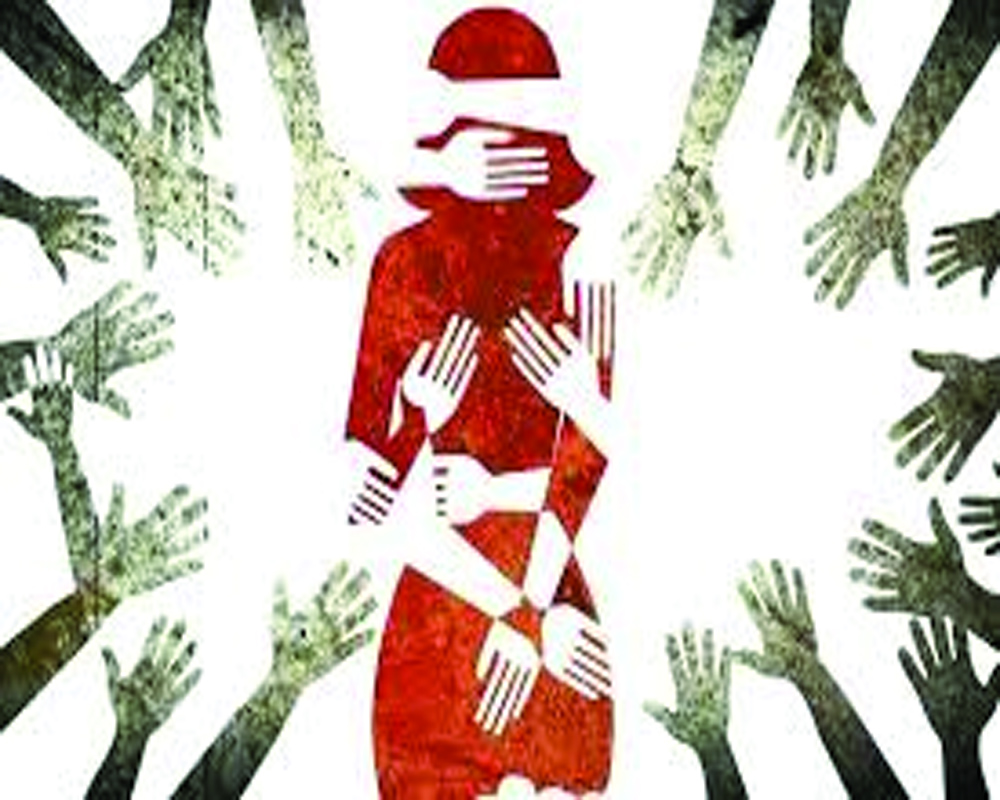Not just law alone but the core issue of innately gendered power relations at workplaces must be urgently addressed
A Delhi-based university's circular advised the girl students to 'draw a tangible line between them and their male counterparts to avoid incidents of sexual harassment', and it drew flak for its overt 'misogynist tones', 'victim-centred outlook' and 'blatant exercise of patriarchal and hierarchical power in the workplace'. The para in question reconfirmed the existence of gender bias.
Social theorist Simone de Beauvoir claims that 'one is not born, but rather becomes a woman through a gender socialisation, whereby, feminine traits and behaviours are acquired'. American philosopher Sally Haslanger said that 'they are causally constructed by social forces'.
Breaking an era of silence, the term 'sexual harassment, was coined in mid-70s by Lin Farley, the American feminist, while, another American feminist scholar, Catharine MacKinnon, asserted that 'it is not just a private sex-based wrong, but, the outcome of a systematic dominance of male-oriented power and suppression'. Sexual exploitation at workplaces is nothing but a reflection of 'the asymmetrical power relations in which women's entry into labour market is considered as a threat to men's traditional superior role as a provider in the family', a US survey reported.
Nevertheless, sexual harassment is a reality for both men and women but 'women have more than twice the risk of becoming a victim of harassment'. The Australian Human Rights Commission found that one in four women and one in six men have been subjected to workplace sexual harassment. In European Union countries, between 40 and 50 per cent of women experience unwanted sexual advances, physical contact or other forms of sexual harassment at work. In the United States, 38 per cent of women have been victims of different forms of harassment, 77 per cent being verbally abused while 51 per cent are touched without permission, and 55 per cent of victims experienced retaliation after making a complaint. A survey by ABC and Washington Post said that '95 per cent of harassers go unpunished, and the perpetrators are often protected'. Across Asia, studies in Japan, Malaysia, the Philippines and South Korea accounted that about 30 to 40 per cent working women face offensive overtures.
Now, the latest report of the World Policy Centre, UCLA, said that more than one-third of the world's countries do not have any laws prohibiting sexual harassment at work, and nearly 235 million working women still remain unprotected. While, the ILO's report observed that 'even where laws exist, they are always compliant with international standards'. China is still mulling over a such a legislation with no clear-cut timeline for implementation.
India does have the PoSH act, 2013, as a legal antidote but its efficacy has been questioned with many women activists dubbing it 'weak in content, and is hardly an empowering instrument, which used only the broad framework of the SC laid down Visakha guidelines and judgement, and, departed in many ways, like by diluting the due process rights, reducing the employer's liability, and there by, allowing to manipulate or bypass the process altogether'. Further, the provision for punishing a woman, if her complaint and evidence found to be false or malicious, 'completely nullifies the objective of the law' commented many lawyers.
In case of women workers in the informal sector, who are 'more often forced to prioritise their income over their well-being', the 'act so far proved to be only a piece of paper'. The local committees (LCs), the redressal fora, exist only in 29 per cent of districts. In the organised sector, 'the employers, by and large, do not play any role in ensuring that the internal complaint committees (ICC) are equipped to deal with the procedures as per law, or have proper co-ordination with the personnel/disciplinary authorities and don't treat the issue as a policy matter and integrate it in service rules', said a Mumbai-based lawyer.
No wonder that a 2016 survey found that 'women victims generally shy away from reporting to the management due to embarrassment, lack of confidence in the complaints mechanism, unawareness and stigma attached with sexual harassment'. An advisory firm which helps listed companies in PoSH act compliance, disclosed that the cases reported to the ICCs of 44 NIFTY companies reduced by 2.6 per cent in 2019-20. In 2019, a reply to a Parliament question revealed that 'there is no centralised data regarding compliance of the act'.
Now, the recent acquittal of a rape-accused former Bishop by a Kerala trial court, which preferred to undermine the undercurrents of unfair power play within the sacred precincts of the church will surely suppress the voice of many such victims.
(The writer is former Director-General, Doordarshan& All India Radio and former Press Secretaryto the President of India. The views expressed are personal.)
























